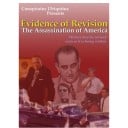
The Civilian Conservation Corps
In 1933, as Franklin D. Roosevelt took his oath of office as the 32nd President of the United States, his people were hurting. From Texas to Detroit to every state in between, citizens were struggling through a 25% unemployment rate, a series of natural disasters, widespread housing foreclosures and food shortages, a stock market that had tumbled by 90%, and little hope for recovery as the Great Depression took hold. Directed by gifted filmmaker Robert Stone, The Civilian Conservation Corps outlines one of the most daring and consequential of the public programs enacted by Roosevelt during this time, a tenant of the New Deal that continues to resonate in our modern world.
Up until that time, the public did not necessarily look upon the government as an engine for bettering their daily lives. Roosevelt's New Deal restructured the function of the government in an unprecedented manner. As part of this string of new programs, the Civilian Conservation Corps (CCC) was designed to reward meaningful work while improving upon the environmental vitality of the nation. Toiling over a period of six months in labor camps across the country, program participants were paid a daily wage to plant trees, repair gullies and embark on other conversation projects. This was many years before environmentalism became one of the country's chief movements.
Roosevelt looked upon the program as a win-win proposition; these efforts would enhance the value of the country's natural resources while keeping its most vulnerable citizens employed. Nevertheless, a vocal opposition did emerge, and blasted the president for ignoring the interests of business, deficit spending and corporate taxes.
The story of the CCC is vividly captured through a wealth of impressive archived materials and a series of new interviews with the men who signed up for the program up until the time of its demise in 1942. The narrative they weave is one of pride, prosperity and patriotism.
The Civilian Conservation Corps is a beautifully assembled and meticulously rendered slice of American history. But it is by no means a dry history lesson; instead, it makes this long-passed era feel personal and inspirational.
Directed by: Robert Stone




Just planning for war 10 years in advance.
Remaind me.. wasn't Roosevelt who ordered civiliand napalm bomardement after pearl harvor? And then give medals to the same men that kill thousans of inocent people, burning them alive, childrens burned alive without problem or hesitation?
Great Documentary!!!! Thanks to the CCC! Something similar now run by the UN to help fix the world now would be great!
Oh what a happy story!
Let's pay starving people $1 a day to plant trees in areas we have destroyed for our greedy needs. Then, when war efforts are "necessary", we send these same poor people to fight for our national interests. USA saves the world again! God must loves us.
C'mon, folks. I know the CCCs are probably better than dying of hunger to these guys, but I think it's important to question the underlying stories of what we are told. It's not a coincidence they were put in a sort of military training if WWII was eminent.
We accept to give scraps to the most needed, so we can make them defend the same system that is oppressive to them. I wonder how bankers were doing before and after the war.
The doc is well made, but feels like some good old propaganda.
Cheers, people. Let's work for some real change in this planet.
My Dad was just 18 when he joined the CCC. He spoke of it highly. Went on to join the US Navy and served during WW2. He was a squad leader in basic because of his CCC experience. He was a good dad and often spoke highly of his beloved Roosevelt and the CCC.
You miss the whole point of this doc, Rose. Because of the severity of the depression, Keynesian, and not Friedmanian, economics was what was needed. Simply telling millions of people without jobs, money, food, or hope that government had to be lean, mean and Jeffersonian would have solved nothing.
Moreover, Jefferson, for all his talk about being a strict constructionist when it came to government, had no qualms whatsoever about being very interventionist when it came to spending a few million dollars of taxpayers' money on buying several thousand square miles of new territory, which became known as the Louisiana Purchase.
For a better understanding of how bleak things were in the first few years of the '30s, read "The Crisis of the Old Order," the first volume of the trilogy on the New Deal by the late Arthur M. Schlesinger, Jr.
Like it or not, government intervention in the economy, the banking system, along with the welfare state, is now a fact of life, not only in America, but in every other country of the civilized world.
Everywhere is just greed now. We should nationalize everything!
The beginning of this video reminds myself of the INTERSTELLAR movie..If anyone has books falling off their shelves & morse code clarification... then please share the co-ordinates to the DEEP STATE bunkers underground with the off world SPACE FORCE preparing to go off planet. DIBS on the one with Matthew McConaghy.
These are wonderful. thanks